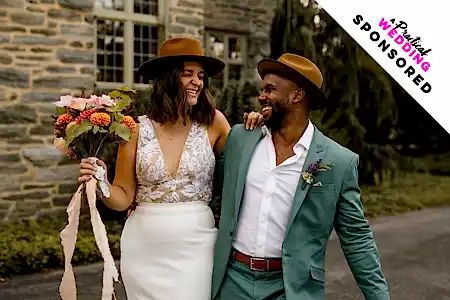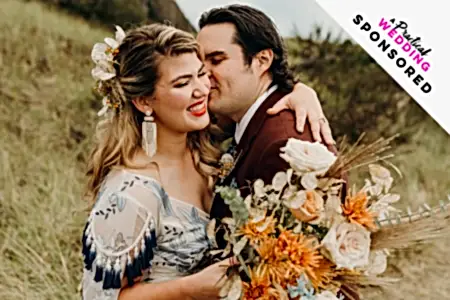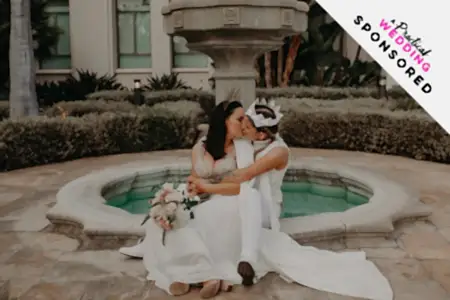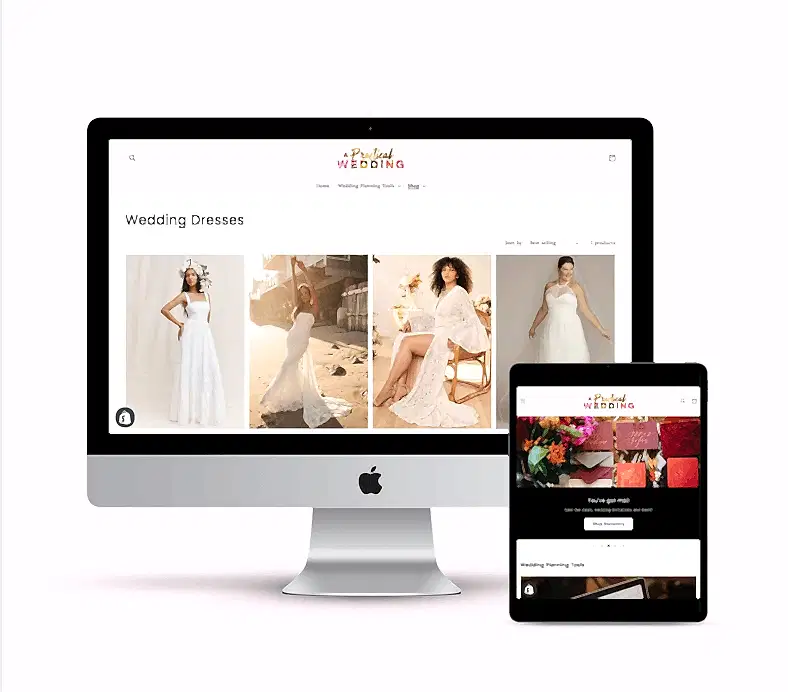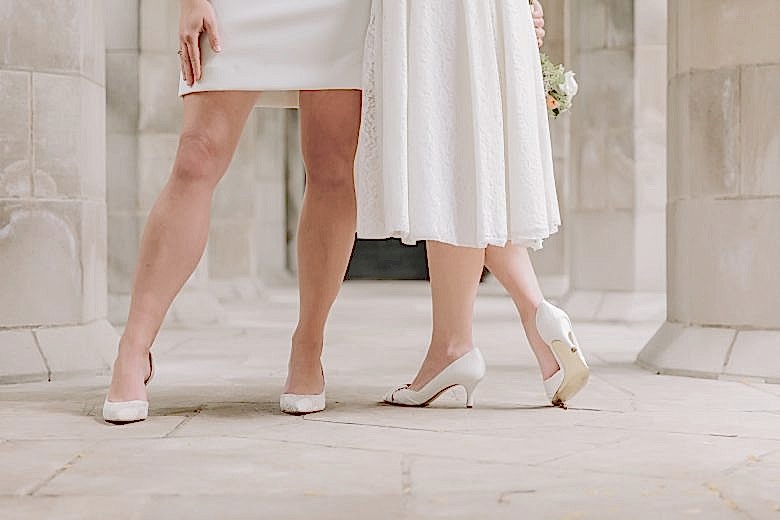
As you, me, and basically the entire world knows, America recently legalized marriage equality. Now that same sex unions are legal, everyone can celebrate love and live in harmony, right? Then why, in the past two weeks, have we gotten multiple emails from APW readers who are super stressed about how their homophobic relatives factor into the wedding planning process? Because, as my friend Katie aptly wrote a few weeks ago on Grist:
“I think gay marriage will end homophobia the same way electing a black president ended racism… I would love to see how many parents call up their estranged children and say NEVERMIND ABOUT KICKING YOU OUT… YOU WERE RIGHT.
The truth is, personal beliefs don’t change just because the legalities do. Undoing prejudice is a process that takes a long time, and a lot of unpacking. Think everyone was jumping for joy when women got the vote? I’m willing to bet that even some of the gentlest, most “well meaning” men were still all “this doesn’t sit well with me.” Making women’s vote a right we take for granted took generations.
Which brings us to the current status in the wedding world. For many older or more traditional people, letting go and adjusting is incredibly difficult (and takes time). I started boldly questioning sexual and gender norms at thirteen. My parents mostly pretended I was straight until I came fully out of the closet during my early twenties. At first, my mom didn’t want me to talk about my sexuality to our extended family, for fear they’d think I was a bad influence on my little cousins. (Because queer is totally catching, hah.) She wasn’t trying to be a jerk, it’s just that gayness was not at all socially acceptable in Iranian communities. Slowly, both my mom and dad came around. Eventually, when my dad remarried, he warned all his wedding guests that I was going to be there with a partner and if they didn’t like it, they need not attend. By the time my dad got remarried when I was twenty-three, my parents had been given a decade to step up.
However, some parents, uncles, aunts, brothers… they haven’t come around (yet). Nobody should plan a wedding around their family’s personal revelatory schedule. But how can you deal with such intense schisms around a day that’s supposed to be full of joy? Autostraddle has supplied us with a handy-dandy form letter for relatives who chose not to attend your gay wedding, but regardless: nothing can change that it’s bittersweet to finally have the right to marriage, but still lack the family support. In fact one APW reader doesn’t even know how to break news of the engagement to her parents:
My girlfriend and I have recently gotten engaged, and we’re looking at a long engagement (like, two years) and a wedding. We’ve got some thoughts, but with the long engagement, a lot of planning isn’t practical yet. One of the reasons we’ve got such a long engagement is that we’re saving up to put on the wedding by ourselves. Her parent can’t afford to contribute. My parents, who otherwise would be in a position to be contributing, have strong religious beliefs about the sanctity of marriage and the first thing my father ever told me when I came out to him was that he would never support me getting married, much less in a church like we plan to.
I’ve read the articles on your site about how to deal with not having your parents at your wedding. I’m in the process of dealing with that. But, on a more practical level, how do I tell my parents that I’m engaged? Look, I handled coming out rather poorly, and caused a lot of drama. I’d like to let my parents know I’m engaged before I tell the world/Facebook/all my friends. My parents have met my girlfriend, and if she wasn’t dating me, I think they’d like her a lot, and even as my girlfriend, they’ve thawed a little over the course of the year that they’ve known her. (We’ve been dating for two years.)
Anyway, do I call my parents? Do I have to tell them in person? Do I text them a photo of the rings? What about the rest of my extended family, who may or may not have picked up on my Facebook relationship status over the past year? Do I send out a card?
And then there’s this APW member, who has the opposite problem:
YIKES. My fiancé and I have a lot of anxiety about our guest list.
I come from a large, very close Southern family with whom I am excited to share my wedding… with one big issue. Many family members are quite transphobic, homophobic, racist, aggressively fundamentalist Christian, and VERY vocal about their views. We’re worried because many of our friends are visibly queer, trans, and/or people of color, and we want to ensure that they are treated well at our event. I would love to assume that everyone will be gracious and loving, but my family is very strident in their beliefs and the last thing we want is That One Auntie casually using racial or ethic slurs. Or someone making disparaging remarks about immigrants, especially as my fiancé’s family is from Greece. Or walking out because I invited a trans cousin that some family members refuse to associate with. We are having a secular, feminist ceremony as well, so some feathers may already be ruffled before the reception starts. We can hardly list “don’t be a turd” on the invitation, so how do we make a safe space for our friends (and avoid soul-crushing anxiety) at our wedding?
In a perfect world, a wedding would be a big love party where everyone checks their personal grievances at the door (and a national marriage equality ruling would mean no more grievances), but that’s never the case. The hardest part is that often, it doesn’t come down to how much your family loves you; it’s just about socialization. They don’t want you to make mistakes. They want “the best” for you. The real conundrum is this: How do you convince them that you’re the only one who knows what “the best” is, and get them to respect that… even if they don’t like it?
There’s no right answer. The truth is, it might just hurt for a while, and some people never come around. Still, I believe in treating those you disagree with gently (even if you feel like their ideas are hateful) because someone’s got to put tolerance first. However, “agree to disagree” can only take you so far. Words (and sidelong glances) can hurt—you, your guests, your partner. In my book, it’s best to set a boundary like, “I know we don’t see eye to eye, but since we love each other, it’s important not to cause one another pain.” The tides are turning, and I try to meet people halfway. There’s no point in rushing anyone. Even my (pretty tolerant) parents took a decade. Remember, a wedding is only a single day, but a marriage continues on. Perhaps they’ll have come around the next time: for the PHD graduation, or business launch, or birth. But in the meanwhile, if they can’t be part of the wedding process without vitriol, then I’d say there’s not a whole lot of space for them in your life. And there’s probably other people who’d be happy to step in to that vacancy.
APW-ers who have been there, how did you talk to your less-than-accepting family members about your wedding?

